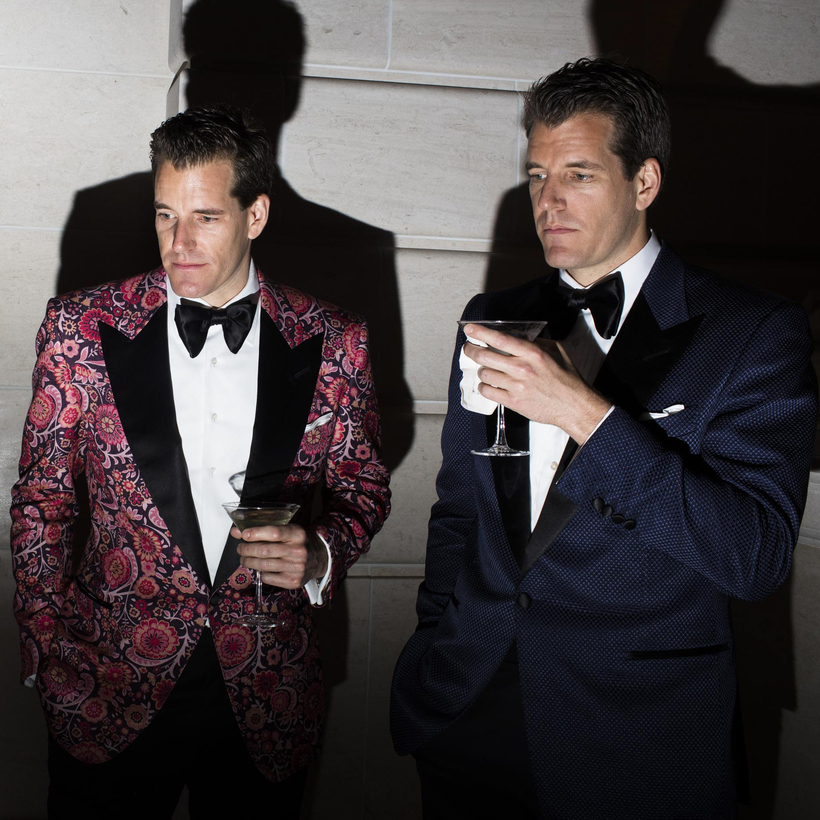It can’t be easy being a Winklevoss twin.
In 2004, as six-foot-five student athletes at Harvard, the brothers—both played by a fittingly obnoxious, pre-cannibal-scandal Armie Hammer in the film The Social Network—famously missed out on Facebook, claiming Mark Zuckerberg stole their idea. (Although, given Facebook’s current image as the source of all evil, perhaps this was not such a bad thing.) They reached a settlement of $65 million, which seems generous until you compare it with how much the Facebook founder is worth ($132.2 billion and counting).
Since then, Cameron and Tyler Winklevoss, now 40, have seemingly been late to everything. In 2008, they took a meager sixth place in the men’s-pairs rowing event at the Beijing Olympics.
In 2012, they founded Winklevoss Capital, a fund that provides angel investments to early-stage companies and entrepreneurs, and announced an $11 billion stake in Bitcoin. Shortly after the announcement, Bitcoin’s price fell from $180 to $80.

Undeterred, in 2013 the Winklevosses invested in BitInstant, an early Bitcoin exchange. It didn’t take long for the company’s C.E.O., Charlie Shrem, to be arrested and sentenced to two years in prison for trading Bitcoins that had been used for illegal drug transactions and money-laundering. BitInstant shut down in late 2013.
Things looked like they were finally taking a turn in 2014, when the twins founded the crypto-currency exchange Gemini and it did not implode. In fact, over several years it developed a reputation as one of the safest places to buy, sell, and store crypto-currency.
Now their future is once again murky.
Double Trouble
It all started when the Winklevosses met another set of twins who happen to resemble Armie Hammer, the Cock Fosters, from whom Gemini bought a start-up called Nifty Gateway.
Nifty Gateway, an auction house that sells digital art, was founded by Duncan and Griffin Cock Foster in 2018. Last year, the 26-year-old twin blockchain entrepreneurs landed a fawning New York magazine spread in which they “forecasted the future of art collecting” despite having no background in art whatsoever.
Equally unknowledgeable when it came to art were the Winklevosses, who jumped in and bought the one-year-old company in 2019. Together, the two sets of twins have maintained their image as tech-world titans while also becoming some of the most hated figures in the digital-art world, operating an arguably flawed product and showing little sign of righting its wrongs.

Following the sale of Nifty Gateway, the Cock Fosters continued to pick the emerging digital artists whose work would be auctioned off on the company’s platform, resulting in incredibly lucrative sales of pieces by artists such as Mike Winkelmann (the artist known as Beeple, whose digital artwork Everydays: The First 5000 Days sold at Christie’s for $69 million earlier this year).
The Winklevosses, meanwhile, did little to improve the company’s interface, which today feels as glitchy and un-user-friendly as it was when it launched, six years ago.
“It’s amateurish and riddled with bugs,” a digital-art strategist says of Nifty Gateway, attributing the bad design and functionality to “a mixture of greed and hubris” at the company. He tells me Nifty Gateway is “extremely unpolished and has been so since launch.”
Users have also been vocal about the way in which Nifty Gateway transfers digital artwork to auction winners. Differing from other digital-art auction houses, such as SuperRare and Rarible, users have complained that Nifty Gateway keeps hold of its inventory even after it is sold, a policy that requires auction winners to take the extra step of transferring the work into their personal crypto-wallets following an auction win.
The Cock Fosters “forecasted the future of art collecting” despite having no background in art whatsoever.
And, while digital-art auction platforms such as Nifty Gateway are required by law to be K.Y.C. (“Know your customer”) compliant—a process mandated by federal guidelines stating that companies must complete identity checks on buyers and sellers, either on their own or with the help of a virtual-asset service provider—there have been reports of Nifty Gateway auction winners’ being unable to pay for the artworks they win.
Imagine if Christie’s or Sotheby’s auctioned off a Picasso only to discover that the winner didn’t have the money to pay for it—we would never hear the end of it. The outrage over the Nifty Gateway winners’ defaulting on their payments has so far remained constrained to Twitter and other digital spaces, and media coverage of the company continues to be glowing.
Nifty Gateway, meanwhile, has been quietly buying up the artworks whose winners defaulted on their payments. Allen Hena, a digital-assets adviser, underlines the need for more transparency in the digital-art auction-house field, and says, “Nifty buying anything is highly problematic.”
This summer, for instance, the winner of an auction of a digital artwork by an artist called Pak—who recently sold a piece at Sotheby’s for $17 million and has been referred to by The Wall Street Journal as the “Pied Piper of virtual art”—turned out not to have the funds to pay for it.
So Nifty Gateway bought the work directly. Then its head of artist relations, a Stanford graduate named Thomas Kimmelman, contacted a bidder who had lost out on the Pak sale—the British-Iranian art collector Amir Soleymani—to see if he would buy the work from them.
(Soleymani declined to comment for this article because of ongoing litigation over Beeple’s Abundance, another digital artwork he purchased on the Nifty Gateway platform, for $600,000.)

SuperRare and Rarible avoid this issue by requiring bidders to transfer Ethereum (an alternative form of crypto-currency to Bitcoin) to a third-party wallet service such as Coinbase as they bid. When someone else bids higher, their deposit is immediately returned to their wallet—no e-mails, no credit cards, and, importantly, no defaulting on payments.
In response to my questions, Griffin Cock Foster tells me that “Nifty Gateway has, and always will, act with the highest integrity possible.”
It’s worth noting that Griffin himself owns 120 works of digital art on Nifty Gateway, while his brother, Duncan, owns 300. Then there are Cameron Winklevoss, who owns 210, and Tyler Winklevoss, who owns 169. Together with the company itself, which currently owns 1,217, we reach the ridiculous number of 2,016 artworks owned in-house.
In response to my questions about Nifty Gateway re-offering the Pak piece to Soleymani, Kimmelman told me, “We offered it to Amir in case he would like it, but there was no requirement of purchasing, simply an offer to let him know that Pak would be paid regardless.”
But there have been times when Nifty Gateway’s artists have not been paid. In one case, the company encouraged the digital artist Matty Mo to create a work for auction on the Web site. Mo spent $20,000 on the work, only to be informed by Kimmelman in March of this year that the auction had been canceled. He was never reimbursed for the $20,000.
In May, another auction, for a new work by artist Bobby Hundreds (author of the best-selling book This Is Not a T-shirt), was abruptly pulled. Hundreds, too, was offered no reimbursement.
He tells me, “In hindsight, they did us a favor by canceling the drop, as I would never want our brand associated with theirs.” Hundreds says his experience has made him “second-guess the integrity of the project.”
The digital artist Farokh Sarmad tells me he has boycotted the Nifty Gateway platform since the unpaid Pak auction was revealed.
Today, the trend-chasing Winklevosses and the would-be digital-art super-curators the Cock Foster twins remain fully supportive of Nifty Gateway. “We actually call our employees astronauts,” Cameron Winklevoss told Forbes in May. “We’re all astronauts building on the frontier of money and the frontier of art and the frontier of finance.” Tyler added, “We feel like we’re on a spaceship, exploring a new frontier.”
Nimrod Kamer is a London-based writer and the author of The Social Climber’s Handbook: A Shameless Guide


